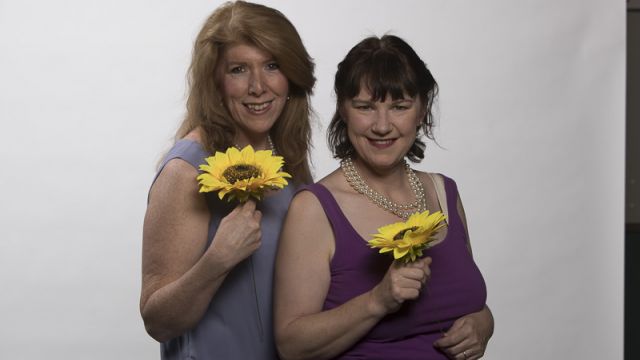Calendar Girls
Julia Griffith and her cast of eleven have taken on the many challenges of this play with confident enthusiasm. Apart from the difficult task of manipulating the “nude" scenes for the calendar shots, there are many scenes, many props and many costume changes. At Pymble, this involves some cooperative space sharing in wings that are not easily accommodating – while still sustaining characterisation and the continuity of the play. And they manage to clear these hurdles very well.
The play is well known because of the movie and the daring women on whom it was based. Griffith describes it as “a story of ordinary people doing extraordinary things, with love, for a good cause”. She sees the play as reminding us “of the strength of friendship, determination, resilience, love and hope”.
Set in a Yorkshire village, it tells the story of members of the local Women’s Institute, who decide to pose (almost) nude for a calendar in order to raise money to buy a sofa for the visitor’s room at the oncology unit of the local hospital. Playwright Tim Firth uses their individual decision-making to develop very real and recognisable characters who are funny, caring – and vulnerable.
Louise Deibe plays Chris, a bit of a rebel who only joined the Women’s Institute to gain some standing with her mother-in-law. Deibe has a strong stage presence and uses her obvious experience to create a Chris who is energetic, self-assured with a slightly brash cheekiness that is infectious.
Her friend Annie, played by Fran Etheridge, is a gentle person who has lovingly supported her husband in his fight against leukemia. Etheridge finds the warmth and earnestness of this character as well as her strength and integrity. It is Annie who first suggests the calendar – and Chris whose passion drives it along.

Their other ‘calendar girls’ are Ruth, Celia and Jessie. Ruth, who is the least enthusiastic of the three, is played by Racquel Boyd. Boyd finds the pace and timing that is important in portraying Ruth’s diffidence and awkward eagerness to please – and her growing confidence and strength.
Celia, played by Bronwyn Courts, is the ‘glamour girl’ of the group. Courts portrays her as poised and positive, secure in her own self and supportive of others.
Maria Karambelas is Jessie, the retired teacher whose humour buoys the group. Karambelas finds the wisdom and tolerance of Jessie and provides comic relief with in some well-timed lines.
 Margaret Olive is Marie, the titular head of the WI group, who is socially ambitious. Olive plays her with a sustained energy that emphasises her fussy affectation and disapproving pretention.
Margaret Olive is Marie, the titular head of the WI group, who is socially ambitious. Olive plays her with a sustained energy that emphasises her fussy affectation and disapproving pretention.
Helen Hunter-Lee doubles effectively as two very different characters – the local ‘dignitary’, Lady Cavendish and a ‘tarty’ beauty consultant.
As Annie’s dying husband, John, Royden Broad finds the quiet strength of this man who is respected for his tolerance and gentle humour. Though the other male characters make relatively brief appearances, Firth draws them with firm strokes and Wills Burke and Murray Fane portray them clearly and effectively.
Ian Ackland’s set creates the austerity of a village church hall with lighting by Graham Boswell and sound designed by Melissa Abrahams. Some projected images bring a little bit of unexpected glitz to a production that is both heart-warming, amusing – and a credit to its director and her cast and crew.
Carol Wimmer
Images: (top) Helen Hunter-Lee & Margaret Olive, (Middle) Prue Foxe, Racquel Boyd, Louise Deibe, Fran Etheridge, Maria Karambelas & Bronwyn Courts, and (lower) Royden Broad, Murray Fand & Wills Burke. Photographer: Ben Townsend @btphotography.
Subscribe to our E-Newsletter, buy our latest print edition or find a Performing Arts book at Book Nook.

